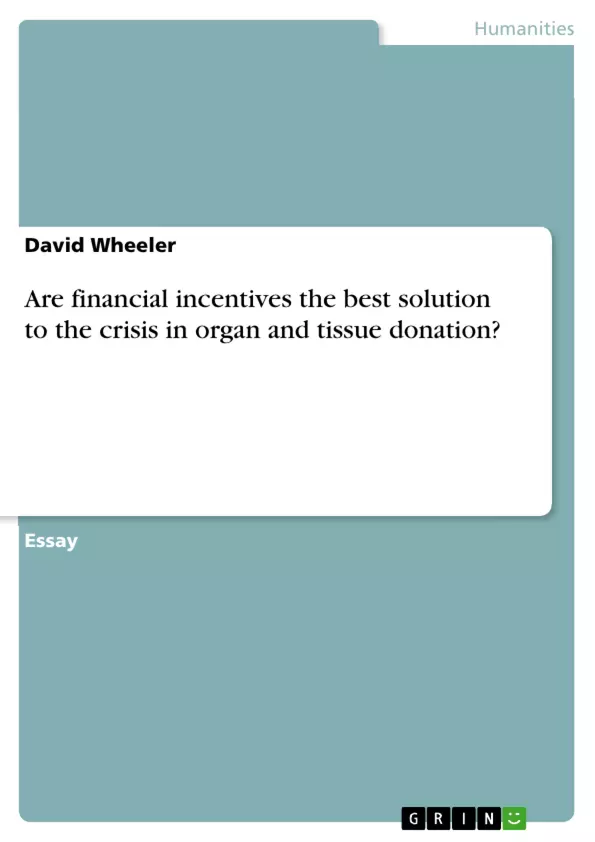For financial incentives to be considered as the best form of solution to the crisis in organ and tissue donation, they have to work effectively and work better than alternative solutions. Examples of financial incentives working include Germany’s use of reductions in social insurance contributions if citizens attend smoking cessation sessions, screenings and dieting classes and a recent U.S. study which found that over a 3-month period participants offered $14 per percentage point of weight loss lost 4.7 pounds and participants offered $7 per percentage point of weight loss lost 3.0 lb compared with 2.0 lb among control group participants 4 (those who received no financial incentive). These are but two examples from worldwide use of financial incentives in motivating and changing behavior. However, there are some issues with the effectiveness of financial incentives for organ and tissue donation, mainly those of the wide and popular range of alternatives and the lack of tangibility for financially incentivized post-mortem donation. The introduction of financial incentives could lead to a reduction in altruistic donations, opponents of financial incentives argue. This decline in altruistic donations will lead to an overall decline in donations and therefore make the crisis even worse. However, financial incentives can easily work alongside altruism, since those who donate altruistically do so for family or friends - people donate for different reasons, and there is no evidence that financial incentives would cause people to stop donating. Even if there is a reduction in altruistic donations these can be more than made up for by the increase in donations caused by financial incentives. The main alternative to financial incentives is the presumed consent or “opt-out” system. Presumed consent asks the people to register to prevent their organs being used after death, as opposed to registering to allow use. This utilizes the perceived apathy of the population and increases the number of post-mortem donations dramatically without causing the same ethical and moral concerns as financial incentives. However, presumed consent has some serious problems, both practical and moral. It does not increase live donations whatsoever, and both people themselves and families of the deceased can simply refuse donation. It also raises questions regarding whether the state can claim people’s bodies without permission.
Inhaltsverzeichnis (Table of Contents)
- Are Financial Incentives the Best Solution to the Crisis in Organ and Tissue Donation?
- Is It Economically Viable?
- Effectiveness of Financial Incentives
- Ethical Considerations
- Fears Surrounding Financial Incentives
Zielsetzung und Themenschwerpunkte (Objectives and Key Themes)
This text aims to investigate the feasibility and effectiveness of financial incentives as a solution to the global crisis in organ and tissue donation. It examines the economic viability, ethical implications, and potential impact of financial incentives on altruistic behavior and societal values. The text also explores alternative approaches like presumed consent and discusses the complexities of the organ donation system, including the black market and the potential for exploitation.
- Economic Viability of Financial Incentives
- Effectiveness of Financial Incentives in Increasing Donation Rates
- Ethical Concerns and the Impact on Altruism
- Alternative Solutions to the Organ Donation Crisis
- Regulation and Prevention of Exploitation
Zusammenfassung der Kapitel (Chapter Summaries)
- Are Financial Incentives the Best Solution to the Crisis in Organ and Tissue Donation?
- Is It Economically Viable? This section discusses the financial feasibility of introducing financial incentives for organ donation. It argues that despite potential initial costs, the savings generated by an increase in donations outweigh the expenses.
- Effectiveness of Financial Incentives: This section examines the effectiveness of financial incentives in motivating behavior change, drawing on examples from other areas such as smoking cessation and weight loss programs. It also addresses concerns regarding a potential decline in altruistic donations.
- Ethical Considerations: This section delves into the ethical issues surrounding financial incentives, specifically addressing concerns about free will, potential exploitation of vulnerable individuals, and the value of altruism. It highlights the need for stringent regulations and a screening process to ensure voluntary and informed consent.
- Fears Surrounding Financial Incentives: This section examines the fears associated with financial incentives, including their potential impact on the value of altruism and the value of life. It counters these concerns by citing research that indicates kidney donors have a similar lifespan and even better quality of life than non-donors.
Schlüsselwörter (Keywords)
The main keywords and focus topics of this text are: organ donation, tissue donation, financial incentives, altruism, presumed consent, ethical considerations, economic viability, organ tourism, black market, exploitation, regulation, and societal values.
Frequently Asked Questions
Are financial incentives effective for organ donation?
While effective in other areas like smoking cessation, their effectiveness for organ donation is debated due to concerns about reducing altruistic motivation.
What is the "opt-out" or presumed consent system?
It is a system where everyone is considered a donor unless they explicitly register to prevent their organs from being used after death.
Would financial incentives stop altruistic donations?
Opponents fear a decline in altruism, but proponents argue that incentives can work alongside altruistic reasons, potentially increasing the overall supply.
Is paying for organs economically viable?
Yes, the long-term savings from successful transplants (e.g., avoiding dialysis costs) often outweigh the initial costs of providing incentives.
What are the ethical concerns regarding financial incentives?
Key concerns include the potential exploitation of vulnerable individuals and the commodification of the human body.
- Quote paper
- David Wheeler (Author), 2011, Are financial incentives the best solution to the crisis in organ and tissue donation?, Munich, GRIN Verlag, https://www.grin.com/document/175048



